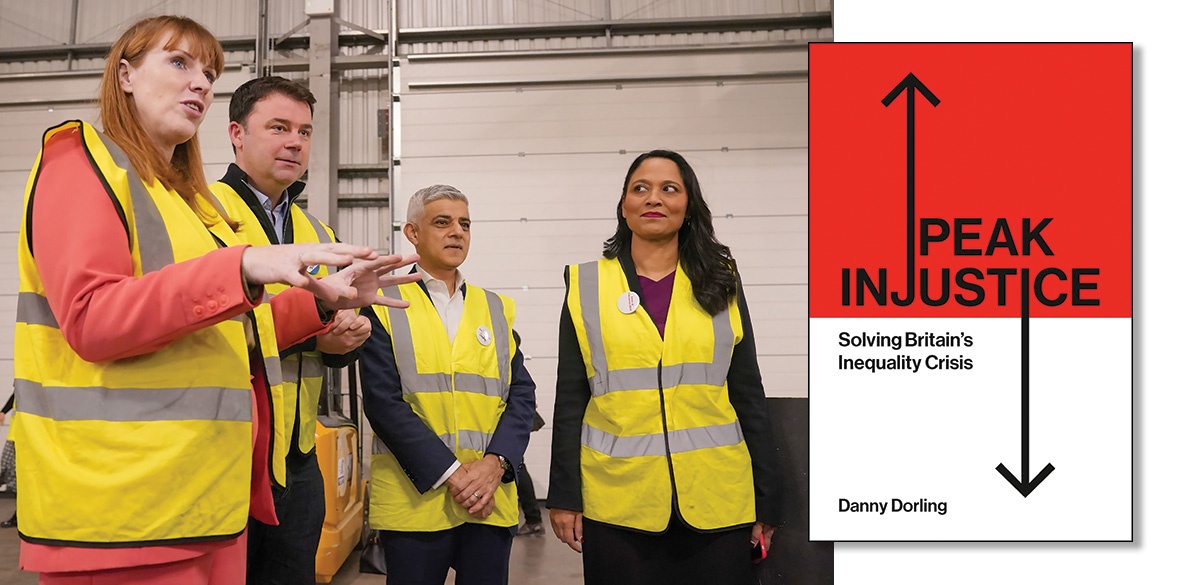This is the last article you can read this month
You can read more article this month
You can read more articles this month
Sorry your limit is up for this month
Reset on:
Please help support the Morning Star by subscribing here
Peak Injustice
Danny Dorling, Policy Press, £14.99
A THIRD of children in the UK live under the poverty line. The UK is now the second most unequal society in Europe, with only Bulgaria worse.
It was not ever thus. Back in 1976, the UK was the second most equal country, after Sweden, and people were happier.
These are some of the salient facts brought together in this impressive work from social geography professor Danny Dorling.
Dorling seeks to pull together a number of the threads that make up one of the most unequal societies in the world. Many of the arguments are familiar, from his previous works Shattered Nation, Seven Children and Slowdown. This should come as no surprise give that each chapter relates to a separate piece written at different times over the years.
This can give a dated feel at times, especially, since the Labour government came to power last year. The strength, though, is that all the works remain true, proving the correctness of the original analysis, even when a few years old.
The arguments are familiar, and revealing of a certain frustration in the author, as he battles to show the injustice of such an unequal society, whilst always pointing to the fact there is another better way. One of the hopeful moments was when Jeremy Corbyn became leader of the Labour Party, carrying the hopes of many, especially the young, with him, and another way of doing things was put onto the public agenda.
The 2017 general election result was a high point. The personal attacks on Corbyn then went into overdrive. Dorling, however, does think Corbyn should have hit back harder against his critics.
The impression of a country drowning as it slides down the international scale is now hard to escape. The underfunding of health, education and welfare. High poverty levels. How the decay of the UK made the country more vulnerable to Covid.
There are some interesting insights into Covid, such as the fact that between 2020 and 2023, 15 per cent of men and 10 per cent of women aged 90-plus died earlier that they would otherwise have done. Also, that excess death levels in the population were higher in the autumn of 2015 than they were in 2020, yet this hardly got a mention in the media at the time.
Dorling points out that austerity policies killed more people than Covid. He claims that “as many as two million were killed through the actions of the government that had been in power up to 2023.”
Housing receives much attention, along with the fact that there are enough rooms in the country to house the population, but many are empty. The author suggests that a drop in prices, maybe via a housing crash, could free up property and enable a realignment. Rent controls or another event could trigger this.
Dorling is a keen advocate of land and wealth taxes. He would also like to see all student debt cancelled. He points out that countries that tax at higher rates have better education, health and transport, less pollution, better housing outcomes and less use of anti-depressants.
The hope that things can improve often comes from looking to other countries. Finland is a favourite, where the population is happy to pay taxes for public services. The society is not as polarised as the UK and people are happier and healthier.
Nearer to home, the Scottish government is more progressive, not having the two child benefit limit. They have also had a Scottish child payment, since 2021, of £25 a week for those in need. The result is that child poverty levels are at 24 per cent of the population and falling. By contrast, in England the level is 29 per cent and rising.
Dorling estimates that child poverty costs the UK £39 billion a year. The author also applauds recent pay deals for rewarding the lowest paid with higher settlements, and so closing the inequality gap a little.
So, it is not all bad news. Dorling believes that UK society is at Peak Injustice, so things should get better, as the country comes down from the peak. Peak Inequality came in 2018. Peak Stupidity came in Spring 2024.
Let’s hope he is correct, with society moving towards being more just, cohesive and equal. Though, given the present direction of travel, I wouldn’t hold your breath.







